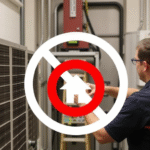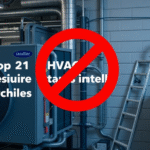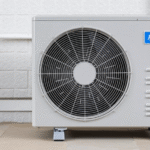Understanding the Difference Between HVAC and AC
When it comes to temperature control in your home or workplace, you may hear the terms HVAC and AC thrown around frequently. While both are related to climate control, they serve distinct purposes and have different systems. Understanding these differences can help you make informed decisions about your heating and cooling needs.
What is AC?
AC stands for air conditioning. It is a system designed primarily to cool indoor spaces during hot weather. An air conditioning unit works by removing heat and humidity from the air inside your home, making it feel cooler and more comfortable. The key components of an AC system typically include:
- Evaporator Coil
- Compressor
- Condenser Coil
- Expansion Valve
- Refrigerant
These components work together to take warm air from inside, cool it down, and then circulate it back into the living space. AC units can be standalone systems, like window or portable units, or part of a larger system, such as central air conditioning.
What is HVAC?
HVAC stands for Heating, Ventilation, and Air Conditioning. This term encompasses a broader range of systems that not only include cooling but also provide heating and ventilation. An HVAC system is designed to maintain a comfortable indoor temperature and enhance air quality in several ways:
- Heating: This aspect generates warm air, often using furnaces or heat pumps.
- Ventilation: It ensures that proper air circulation occurs, allowing fresh air to enter and stale air to exit.
- Air Conditioning: This provides cooling similar to standalone AC units.
Modern HVAC systems can be complex, integrating various technologies to manage heating, cooling, and air quality, all from one centralized unit.
Key Differences Between HVAC and AC
| Feature | AC | HVAC |
|---|---|---|
| Function | Cooling indoor spaces | Heating, cooling, and ventilation |
| Complexity | Less complex | More complex, integrates multiple systems |
| Components | Mainly refrigeration cycle components | Includes heating units, ventilators, and AC units |
| Use Cases | Residential cooling in specific rooms | Whole-house climate control and air quality management |
Choosing between HVAC and AC depends on your specific needs. If your primary requirement is cooling, a standalone AC unit might suffice. However, if you need a system that handles both heating and cooling, then an HVAC system is your best bet.
Benefits of HVAC Systems
Many homeowners and businesses opt for HVAC systems because they provide numerous advantages:
- Energy Efficiency: Modern HVAC systems are designed to use less energy while providing optimal climate control.
- Air Quality: HVAC systems often include filtration systems that can improve indoor air quality.
- Convenience: A single system can control temperature and ventilation, making it easier to manage.
When Do You Need an AC Unit?
There are times when an AC unit may be ideal. For example:
- In small apartments or single rooms, a window or portable AC could effectively cool your space without needing a full HVAC system.
- If your area experiences mild winters, you might not need heating capabilities.
Whether you choose an AC unit or an HVAC system, understanding their differences can help you make the best choice for your temperature control needs. For more information about HVAC systems, visit Energy Star’s guidelines or check out HVAC.com for industry tips and advice.
The Components of an HVAC System
An HVAC system is essential for modern living, providing comfort through heating, ventilation, and air conditioning. Understanding its components can help you appreciate how these systems work together to maintain a pleasant indoor environment. Below are the key elements of an HVAC system.
Heating Components
Heating is a critical part of an HVAC system, particularly in colder climates. The primary components that deliver heat include:
- Furnace: This appliance generates heat for your home, powered by electricity, natural gas, or fuel oil.
- Heat Pump: Heat pumps can provide both heating and cooling by transferring heat from one place to another.
- Boiler: A boiler heats water or steam that circulates through radiators to warm the home.
Ventilation Components
Proper ventilation is crucial for maintaining air quality within your home. The ventilation components include:
- Ducts: These channels transport heated or cooled air throughout your home.
- Vents: Vents allow conditioned air to enter and exit rooms, helping to regulate temperature and airflow.
- Exhaust Fans: These fans remove stale air, odors, and moisture from your home to improve air quality.
Air Conditioning Components
Air conditioning is vital during hot months, and its components work closely with heating elements. Key parts include:
- Compressor: The heart of the AC system, the compressor circulates refrigerant through the system to cool your home.
- Evaporator Coil: This coil absorbs heat from indoor air, cooling it before it’s circulated back into the living spaces.
- Condenser Coil: Located outside, this coil releases heat absorbed from indoor air into the outdoors.
- Thermostat: The thermostat is the control unit that allows you to set your cooling and heating preferences.
Refrigerant
Refrigerant is a crucial element in the air conditioning process. It changes states from gas to liquid and back, facilitating the heat exchange that cools indoor air. The two most common types of refrigerants are:
- R-410A: A modern refrigerant with improved energy efficiency and lower environmental impact.
- R-22: An older refrigerant being phased out due to its ozone-depleting properties.
Control Systems
Modern HVAC systems come equipped with sophisticated control systems to enhance efficiency and ease of use:
- Smart Thermostats: These devices learn your preferences and adjust settings accordingly to save energy.
- Automated Zones: Many systems allow for zoning, letting you control the temperature in different areas of your home independently.
Importance of Regular Maintenance
Understanding these components is only part of owning an HVAC system. Regular maintenance is essential for optimal performance. Here are some maintenance tasks you should consider:
- Changing filters regularly to improve air quality and system efficiency.
- Cleaning the coils and ducts to ensure proper airflow.
- Scheduling annual inspections by a professional HVAC technician to catch potential issues early.
In addition to these tips, you can extend the life of your HVAC system by ensuring your home is properly insulated, as this helps maintain the desired temperature more efficiently.
For more detailed information on HVAC systems and maintenance, you can visit Energy Saver, or explore the resources available at HVAC.com.
Understanding the components of your HVAC system can empower you in maintaining a comfortable and healthy living environment while optimizing energy efficiency. Whether you’re looking to upgrade your system or just ensure you’re keeping up with routine maintenance, knowledge is key to making informed decisions.
How Air Conditioners Work
Air conditioners are essential appliances that help maintain a comfortable indoor environment, especially during hot summer months. Understanding how they work can help you better appreciate their function and importance.
At their core, air conditioners operate using a simple machinery principle known as refrigeration. This process involves removing heat from the indoor air and transferring it outside, leaving your space cool and comfortable. Let’s break down the main components and the cycle involved in air conditioning.
Key Components of an Air Conditioner
- Evaporator Coil: This component is located indoors and absorbs heat from the inside air.
- Condenser Coil: Situated outside, this coil releases the absorbed heat into the outdoor air.
- Compressor: This device pumps the refrigerant between the evaporator and condenser, making it essential for the cooling cycle.
- Expansion Valve: This controls the flow of the refrigerant and reduces its pressure before it enters the evaporator coil.
- Refrigerant: A specialized fluid that absorbs and transfers heat, enabling the cooling process.
The Refrigeration Cycle
The air conditioning system functions through a continuous cycle known as the refrigeration cycle. Here’s how it works step-by-step:
- Evaporation: The refrigerant enters the evaporator coil, where it absorbs heat from the indoor air. As the refrigerant picks up heat, it transforms from a liquid to a gas.
- Compression: The compressor takes the gas refrigerant and compresses it, raising its pressure and temperature. This high-pressure gas then moves to the condenser coil.
- Condensation: In the condenser, the hot gas releases its heat to the outside air and turns back into a liquid. This process cools down the gas significantly.
- Expansion: The refrigerant then passes through the expansion valve, where it experiences a drop in pressure. This prepares it to absorb heat again as it returns to the evaporator.
This continuous cycle ensures the air inside your home is kept cool, providing comfort on the hottest days.
Importance of Regular Maintenance
To keep your air conditioner running smoothly, regular maintenance is crucial. Here are vital maintenance tips:
- Change or clean filters monthly to ensure good airflow.
- Inspect the evaporator and condenser coils for dirt and debris.
- Check and clean the drainage system to avoid clogs.
- Schedule professional inspections at least once a year.
Maintaining your unit not only enhances cooling efficiency but also extends the lifespan of the appliance.
Energy Efficiency Considerations
Air conditioners consume a significant amount of energy, but many modern units are designed to be energy-efficient. Look for models with a high SEER (Seasonal Energy Efficiency Ratio) rating, as they can reduce energy consumption while providing effective cooling.
Tips for improving your air conditioning efficiency include:
- Utilizing fans to circulate cool air.
- Sealing windows and doors to prevent cool air from escaping.
- Using programmable thermostats to optimize temperature control.
on AC Performance
Understanding how air conditioners work can help you maximize their performance and efficiency. By familiarizing yourself with the main components and maintenance practices, you can enjoy a comfortable indoor climate without incurring high energy costs.
For more detailed information about air conditioning systems and maintenance tips, visit Energy Saver – Air Conditioning or ACHR News – Top 5 Tips to Maintain Your AC.
By engaging with the essential workings of your air conditioning unit, you can take better care of this vital appliance and create a more comfortable living space.
The Importance of Proper HVAC Maintenance
Proper maintenance of HVAC systems is crucial for both efficiency and longevity. Whether you’re a homeowner or a business owner, taking care of your heating, ventilation, and air conditioning (HVAC) system ensures optimal performance. Here’s why regular HVAC maintenance is essential.
Improved Energy Efficiency
One of the main benefits of regular HVAC maintenance is enhanced energy efficiency. When your system is well-maintained, it uses energy more effectively. This can lead to lower utility bills, as a clean and optimized system requires less energy to operate. Here are a few ways proper maintenance can help:
- Cleaning or replacing filters to enhance airflow.
- Ensuring ductwork is sealed properly to prevent air leaks.
- Checking refrigerant levels to maintain system efficiency.
Extended Lifespan of the System
Regular maintenance can significantly extend the lifespan of your HVAC system. Like any other machinery, HVAC systems need care to operate optimally. Components endure wear and tear, but timely inspections and servicing can catch potential problems before they become major issues. Here’s what you can do:
- Schedule professional inspections at least once a year.
- Keep the area around outdoor units clear and free of debris.
- Check for signs of corrosion or damage in components.
Enhanced Indoor Air Quality
Proper maintenance of your HVAC system also ensures better indoor air quality. Clean and well-maintained systems can significantly reduce the level of allergens and pollutants in your home or office environment. Some factors that contribute to better air quality include:
- Changing air filters regularly to trap dust and other particles.
- Cleaning ducts to prevent dust buildup.
- Checking and maintaining humidity levels to reduce mold growth.
Cost Savings on Repairs
Staying ahead of problems saves money in the long run. Regular maintenance helps identify minor issues before they escalate into costly repairs. By addressing problems early on, you can prevent unexpected breakdowns that can leave you without heating or cooling. Some costs to consider include:
- Service calls for emergency repairs can be more expensive.
- Replacing an entire HVAC system costs significantly more than maintaining it.
- Regular maintenance can lead to warranty preservation, avoiding voiding of services.
Compliance with Manufacturer Guidelines
Many manufacturers require regular maintenance to keep warranties valid. Keeping up with maintenance ensures that your system meets the manufacturer’s standards. This can protect your investment should issues arise. Pay attention to:
- Manufacturer guidelines on cooling and heating checks.
- Documentation of service history to show compliance.
- Regularly replacing parts as specified by the warranty.
Peace of Mind
Knowing that your HVAC system is in good working order can provide peace of mind. Whether it’s the middle of winter or the heat of summer, you want to be sure your home will remain comfortable. Regular maintenance helps assure you that your HVAC system will perform efficiently when you need it most.
Final Thoughts
In short, regular HVAC maintenance is not just about comfort; it’s about ensuring safety, reducing energy costs, and prolonging the life of your system. To establish a proper maintenance routine, consider working with professionals who understand your specific HVAC needs. For more detailed information on HVAC maintenance practices, you can visit Energy Star or HVAC.com for expert guidance.
Remember, taking the time for regular HVAC maintenance will lead to a more comfortable living or working environment and save you money in the long run.
Energy Efficiency in HVAC vs. AC Units
Understanding energy efficiency is crucial when choosing a climate control system for your home or business. Many people often confuse HVAC systems with AC units, not realizing there are significant differences in energy efficiency between the two. Let’s break down what sets them apart and how making an informed decision can lead to savings.
HVAC stands for Heating, Ventilation, and Air Conditioning. This comprehensive system is designed to control the indoor climate year-round. In contrast, an AC (air conditioning) unit primarily cools the air within a space. While both systems achieve comfort, their energy efficiency performances vary widely due to their design and functionality.
Energy efficiency is measured by various ratings for both systems. Here’s a quick look:
- SEER: Seasonal Energy Efficiency Ratio, applies to cooling performance of AC units.
- HSPF: Heating Seasonal Performance Factor, measures the efficiency of heating systems in HVAC systems.
- EER: Energy Efficiency Ratio, indicates the energy efficiency of both HVAC and AC units at peak load.
When comparing HVAC systems and AC units, consider the following factors regarding energy efficiency:
- Energy Use: HVAC systems can be more energy-efficient over time despite being more complex. This is because they can heat, cool, and even filter air, providing comprehensive comfort and air quality.
- Temperature Control: HVAC systems often come equipped with smart thermostats that allow for precise temperature control, thus optimizing energy usage based on your needs.
- Air Filtration and Ventilation: HVAC systems offer improved air filtration. Better air quality can lead to reduced energy consumption in heating and cooling your space.
On the other hand, standalone AC units may seem cost-effective initially but can often lead to higher energy bills if not sized or used properly. They do not provide the same level of heating or air quality management, which can affect overall energy efficiency.
Operational costs also vary significantly between the two systems. An HVAC system generally has a higher upfront cost but can save on long-term energy bills with proper installation and maintenance. Here’s a useful table comparing some cost factors:
| Factor | HVAC System | AC Unit |
|---|---|---|
| Initial Cost | Higher | Lower |
| Operating Costs | Lower | Higher |
| Energy Efficiency Ratings | Higher SEER and HSPF | Lower SEER rating |
| Heating Capability | Yes | No |
To make your home more energy-efficient, consider the following tips:
- Regular maintenance can help keep your HVAC system running optimally. Change filters and schedule professional service checks annually.
- Invest in a programmable or smart thermostat. This allows you to set schedules for various times of the day, reducing unnecessary heating or cooling.
- Seal doors and windows to prevent drafts, which can lead to wasted energy. This is essential for both HVAC systems and AC units.
- Use ceiling fans to help circulate cool air during hot months and warm air during colder months; this can significantly reduce energy costs.
Ultimately, both HVAC and AC units serve distinct purposes, and understanding their energy efficiency can help you make informed decisions. If you require a system that provides comprehensive climate control and energy savings, an HVAC system might be your best choice. However, if cooling is your sole concern, a well-maintained AC unit can effectively meet your needs. For more detailed information and guidance, consider checking resources like Energy Saver and AHRI.
Taking the time to evaluate your options can lead to significant savings and improved comfort in your space, so consider both your immediate and long-term needs when selecting your climate control solutions.
Common Myths About HVAC and AC
When it comes to HVAC and AC systems, many people hold onto certain myths that can lead to misunderstanding and confusion. Clearing up these misconceptions is crucial for making informed decisions about home heating, cooling, and ventilation. Here are some common myths regarding HVAC and AC systems:
Myth #1: HVAC and AC are the Same
One of the biggest misconceptions is that HVAC (Heating, Ventilation, and Air Conditioning) and AC (Air Conditioning) are the same. While AC is a part of HVAC, HVAC systems encompass much more. They include heating and ventilation too, which means they regulate air flow, temperature, and air quality throughout your entire home. Understanding this difference helps you make better choices for your home’s climate control needs.
Myth #2: Bigger Units Are Always Better
Many homeowners believe that the larger the unit, the better it will perform. However, this isn’t true. An oversized unit can lead to short cycling, where the system turns on and off frequently. This causes inefficient operation, higher energy bills, and worn-out components. A properly sized unit is crucial for efficiency and comfort. Consulting with a professional is essential to determine the right size for your space.
Myth #3: Regular Maintenance Isn’t Necessary
Some people think that once they install their HVAC system, there’s no need for regular maintenance. This is a dangerous myth. Regular maintenance ensures your system runs efficiently and prolongs its lifespan. Neglecting maintenance can lead to costly repairs and system failures. You should schedule annual inspections with a qualified technician to check filters, ducts, and other essential components.
Myth #4: You Only Need to Change Your Filter Once a Year
While it’s good to know that filters need changing, many homeowners mistakenly believe that once a year is sufficient. In reality, filter replacement frequency depends on usage, type, and environmental factors. In a home with pets, for instance, changing filters every month might be necessary. Regularly checking your filters can help improve indoor air quality and enhance system efficiency. Here’s a simple schedule:
| Frequency | Recommended Action |
|---|---|
| Monthly | Change filter in high-use scenarios (pets, dust, etc.) |
| Every 3 Months | Change filter in moderate-use scenarios |
| Every 6 Months | Change filter in low-use scenarios |
Myth #5: Closing Vents in Unused Rooms Saves Energy
It might seem logical to close vents in unused rooms to save energy, but this can actually hurt your HVAC system. When you close vents, it can increase pressure in the ductwork and can reduce airflow in the system. This can lead to inefficiencies and even damage to your HVAC unit over time. Instead, consider adjusting the thermostat or updating your insulation to improve energy efficiency.
Myth #6: You Can Stop Using Your HVAC System in the Off-Season
Another misconception is that HVAC systems can be turned off altogether during off-seasons. While it may seem tempting, turning off your system completely can allow dirt and debris to accumulate in your ducts. Regular usage keeps air circulating and maintains indoor air quality. Instead, consider setting your system to a low setting during off-seasons to keep air flowing and components cleaned.
Myth #7: Programmable Thermostats Will Solve All Your Problems
While programmable thermostats do offer energy-saving benefits, they are not a cure-all for HVAC issues. Misprogramming or overlooking proper settings can lead to confusion and higher bills. It’s essential to understand how to program your thermostat correctly to take full advantage of its features. If you’re unsure, consulting a technician can be immensely helpful.
Understanding these myths can help you manage your HVAC and AC systems better and make informed decisions regarding your home’s climate. For comprehensive resources on HVAC maintenance and related services, visit Energy Star and The Air Conditioning, Heating, and Refrigeration Institute (AHRI).
Stay informed and proactive about your HVAC and AC systems, ensuring comfort and efficiency in your home!
Choosing the Right System for Your Home
When deciding on a climate control system for your home, it’s important to understand the different options available. Numerous variables such as the size of your home, local climate, energy efficiency, and budget will play a crucial role in your decision. Here’s a breakdown of crucial factors to consider when choosing the right system.
Types of Climate Control Systems
There are a few main types of climate control systems you can consider:
- Heating, Ventilation, and Air Conditioning (HVAC): This comprehensive system regulates heating, cooling, and air quality. HVAC systems can include furnaces, air conditioners, and air purifiers.
- Air Conditioning (AC): This system is specifically for cooling your home. While it can effectively reduce temperatures, it does not provide heating or ventilation like HVAC systems.
- Geothermal Systems: These utilize the earth’s natural heat to provide both heating and cooling. They are highly efficient but can have a higher initial setup cost.
- Ductless Mini-Split Systems: Great for homes without ductwork, these systems offer heating and cooling to specific areas of your home, providing flexibility and efficiency.
Consider Your Climate
Your local weather patterns will significantly affect your system choice. If you live in a region where summers are long and hot, a powerful air conditioning unit might be more critical. Conversely, for areas with severe winters, a robust heating system becomes essential.
Energy Efficiency
When selecting a system, energy efficiency should be at the forefront of your considerations. Look for systems with a high SEER (Seasonal Energy Efficiency Ratio) rating for air conditioners and AFUE (Annual Fuel Utilization Efficiency) for heating systems. A more efficient system will save you money in the long run through lower energy bills.
Also, consider the benefits of Energy Star certified appliances. They meet strict energy efficiency guidelines set by the U.S. Environmental Protection Agency.
Size Matters
The size of your system must match the size of your home. An undersized system may not cool or heat your space efficiently, while an oversized unit could lead to increased energy consumption and discomfort. A professional HVAC contractor can perform a load calculation to determine the appropriate size for your needs.
Maintenance and Longevity
Regular maintenance is vital to keep your climate control system running efficiently. Some systems require more frequent servicing than others. For instance, ducted systems might need regular duct cleaning, while ductless systems have fewer maintenance demands.
Duration of service also plays a part in your decision. AC units generally last between 10 and 15 years, whereas HVAC systems can last up to 20 years with proper care.
Cost Considerations
It’s essential to consider both the initial installation costs and the ongoing operating expenses. Here’s a quick breakdown:
| System Type | Installation Cost | Annual Operating Cost |
|---|---|---|
| HVAC | $5,000 – $12,000 | $1,200 – $2,500 |
| Central AC | $3,000 – $7,000 | $800 – $1,800 |
| Ductless Mini-Split | $2,000 – $5,000 | $600 – $1,500 |
| Geothermal | $10,000 – $30,000 | $400 – $1,200 |
Discuss your budget openly with contractors and explore financing options that may be available. A skilled professional can guide you on which system fits your financial situation while fulfilling your climate control needs.
Professional Advice
Consulting with a licensed HVAC professional is invaluable. They can evaluate your home, consider your specific needs, and recommend a system that aligns with your lifestyle and financial plan. For more detailed insights, you may check [Energy Star](https://www.energystar.gov/) here or [HVAC.com](https://www.hvac.com/) here.
The future comfort of your home depends on the system you choose. Take your time, consider your options, and make an informed decision to ensure you have the perfect climate control solution for your household.
Key Takeaway:
Understanding the difference between HVAC and AC is crucial for homeowners and building occupants. While both systems are essential for climate control, they serve distinct purposes. HVAC, which stands for Heating, Ventilation, and Air Conditioning, refers to a comprehensive system that manages indoor climate, ensuring comfort throughout the year. In contrast, an AC system is simply a component of HVAC focused solely on cooling indoor air. This distinction is foundational for anyone looking to improve their indoor environment.
An HVAC system comprises various components, including furnaces, heat pumps, air handlers, and ductwork. Each part plays a role in regulating temperature and air quality, making HVAC a multifaceted approach to home comfort. On the other hand, air conditioners primarily work by absorbing heat from indoor air and expelling it outdoors. Understanding how these components work together can help you appreciate the complexity and efficiency of HVAC systems compared to standalone AC units.
Maintenance is another critical aspect of HVAC systems. Regular upkeep ensures that both heating and cooling functions operate smoothly, extending the life of the equipment and improving energy efficiency. Neglecting maintenance can lead to higher energy bills and costly repairs, emphasizing the need to commit to regular assessments by qualified professionals.
Energy efficiency is an important consideration when choosing between an HVAC system and an AC unit. Modern HVAC systems often come with energy-efficient options, reducing utility bills and minimizing environmental impact. In contrast, standard AC units may lack this comprehensive efficiency focus. It’s essential to weigh these energy considerations when making a purchase.
Common myths regarding HVAC and AC can lead to confusion. Many people mistakenly believe that an AC unit can replace an HVAC system; however, it’s important to recognize that this isn’t advisable for optimal home comfort. Additionally, choosing the right system for your home can significantly enhance your living experience. Understanding the specific needs of your space—such as size, insulation, and climate—plays a vital role in this decision-making process.
Grasping the nuances between HVAC systems and AC units enables informed decisions for homeowners. By prioritizing proper maintenance and energy efficiency, you not only create a comfortable environment but also save money and resources in the long term.
Conclusion
Differentiating between HVAC and AC is crucial for homeowners trying to navigate their heating and cooling options. While air conditioning is just one part of an HVAC system, understanding the broader scope of HVAC can help you make informed decisions about your climate control needs. HVAC systems incorporate heating, ventilation, and cooling to maintain optimal indoor air quality and comfort year-round, whereas AC units focus solely on cooling your space.
Identifying the various components of an HVAC system highlights its complexity and the importance of each part working in harmony. In contrast, while air conditioners excel at lowering temperatures, they don’t regulate humidity levels or provide warmth during colder months. Familiarity with how air conditioners operate showcases their role within the larger HVAC framework.
Maintaining your HVAC system is essential for longevity and efficiency. Regular upkeep prevents costly repairs and ensures your home remains comfortable. On the energy efficiency front, HVAC systems often offer advantages that go beyond what traditional AC units provide, potentially leading to lower energy bills over time.
Debunking common myths about HVAC and AC can clear up misconceptions and help you appreciate the benefits of investing in a comprehensive system. Ultimately, choosing the right system for your home requires careful consideration of your specific needs, budget, and the size of your living space. By understanding these elements, you can make a well-informed choice that will enhance your home’s comfort while being mindful of energy efficiency and costs.






Leave a Reply